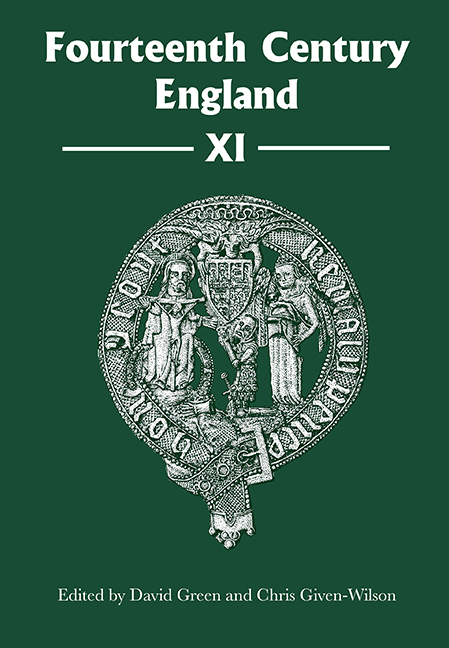Book contents
- Frontmatter
- Contents
- List of Illustrations
- List of Contributors
- Preface
- Abbreviations
- The Evolution of Edward I's ‘Historical’ Claim to Overlordship of Scotland, 1291–1301
- Prelates and Political Reform: The Bishops and the Ordinances of 1311
- Sir Robert de Wateville (d. 1330) of Essex and the Younger Despenser, 1322–6
- Memory, Genealogy and Nationality in Plantagenet England: The Plugenet and Walerand Estates, 1265–1368
- The ‘Apparitional’ Magna Carta in the Long Fourteenth Century
- Family, Loyalty and the Royal Household in Fourteenth-Century England
- The Revolution Stops Here? Leicestershire and the Rebellion of 1381
- FOURTEENTH CENTURY ENGLAND ISSN 1471–3020
Sir Robert de Wateville (d. 1330) of Essex and the Younger Despenser, 1322–6
Published online by Cambridge University Press: 14 September 2019
- Frontmatter
- Contents
- List of Illustrations
- List of Contributors
- Preface
- Abbreviations
- The Evolution of Edward I's ‘Historical’ Claim to Overlordship of Scotland, 1291–1301
- Prelates and Political Reform: The Bishops and the Ordinances of 1311
- Sir Robert de Wateville (d. 1330) of Essex and the Younger Despenser, 1322–6
- Memory, Genealogy and Nationality in Plantagenet England: The Plugenet and Walerand Estates, 1265–1368
- The ‘Apparitional’ Magna Carta in the Long Fourteenth Century
- Family, Loyalty and the Royal Household in Fourteenth-Century England
- The Revolution Stops Here? Leicestershire and the Rebellion of 1381
- FOURTEENTH CENTURY ENGLAND ISSN 1471–3020
Summary
The decade of the 1320s was among the more turbulent in English history. The increasing tensions of the 1310s culminated in the courtier revolt of 1321–2 against the Despensers, the four-year Despenser regime, Queen Isabella's coup of 1326, the four-year Mortimer regime and then the palace revolution of 1330. Many came to grief, although there were fewer executions and forfeitures in 1326 and 1330 than in 1322, but some individuals navigated between the various perils more successfully and among them was Sir Robert de Wateville. He played, or might have played, a pivotal role in the autumn of 1326 when Isabella's force landed and the Despenser regime collapsed. He has therefore been mentioned in accounts of that period that attempt to explain the swiftness and completeness of that collapse. These explanations generally focus on the lack of loyalty displayed by royal and magnate followers, and superficially Wateville's career appears to bear out these judgements.
A landless younger son of an Essex gentry family, in the 1310s he became a valued retainer of Bartholomew de Badlesmere and, as a consequence, was one of the Contrariants in 1321–2. After the execution of Badlesmere he became a bachelor of the younger Despenser, played a leading role in the Gascon ‘War of Saint-Sardos’ in 1324–5, and also became intimate with the king, gaining thereby a rich marriage to the widow Margaret Martin. In the autumn of 1326 he moved swiftly to join Isabella and spent his last four years as a peer of parliament enjoying considerable wealth. He ended his life full of years and honour but, it would seem, had twice turned his coat. A closer look at his life, and in particular his activities during the Despenser regime, helps to explain why. This paper will look first at his family background and earlier career before giving an account of his activities during the Despenser regime and then attempting an assessment of his behaviour.
Robert de Wateville and his brother Roger were, almost certainly, younger brothers of Sir John de Wateville of Panfield and Hempstead (Essex) who had succeeded his father, William, by 1302. They had a sister who had married the Suffolk knight Sir William de Criketot (d. 1310), but, as was so often the case at this level of society, there was no land to spare for younger sons.
- Type
- Chapter
- Information
- Fourteenth Century England XI , pp. 57 - 76Publisher: Boydell & BrewerPrint publication year: 2019



